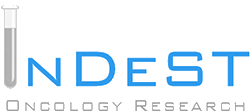INSTITUTIONAL AND PRIVATE FUNDING
Clonal Heterogeneity in Cancer: Liquid Biopsy as High Performance Technology
| Funding agency | VLC-BioClinic | Amount | 6.000€ |
| PI | Andrés Cervantes (INCLIVA) -Rosa Noguera (UV) | ||
| Duration | 1 year | ||
| Abstract | Collaboration between the translational research groups in neuroblastoma (NB, DP-UV) and colorectal cancer (CCR, INCLIVA) is proposed to achieve a more effective development of the liquid biopsy in cancer by combining and transferring two innovative techniques in the diagnosis, Prognosis and prediction in cancer. Currently cancer screening involves both the analysis of tissue samples and biological fluids, as well as sophisticated imaging techniques. The project aims to generate a model to increase the sensitivity of the liquid biopsy in cancer and to be able to catalog and integrate all the genomic findings obtained by implementing the microscopic digital imaging and genomic DNA scanning (ctDNA) Dissociated in NB and CCR respectively. The NB microscopic digital imaging analysis model, used in> 500 biopsies, will be extrapolated to the specific characteristics of CCR biopsies. It will be necessary to adapt the measurement tools and methods of quantification and analysis of the tumor cell, stromal and the amount of elements of the extracellular matrix. As a result of the adaptation of the model will obtain the key morphological information to be able to validate the findings observed at the subclonal level in the biopsy and in the blood of the patients. On the other hand, the reference parameters of the isolation, quantification and genomic analysis of ctDNA used in serum samples from patients affected by RCC will be adjusted to achieve the identification of subclonal alterations in serum of children affected by NB. Genetic alterations have recently been described that define molecular groups of patients, susceptible to targeted pharmacological therapies. As a result of the study, it is planned to identify the subclones of altered genes present in the tumor samples thus contributing to increase the clinical potentiality of the liquid biopsy. The information obtained by these two pathways, together with the information (morphological and genetic) previously obtained from tumor biopsies, will be the basis for the optimization and the complex detection of clonal and subclonal heterogeneity with respect to alterations in genes Tumor suppressors and oncogenes. | ||
Analysis of microRNA expression in tumor tissue of young women under 35 years
| Funding agency | Fundación Le Cadó – contra el cáncer de mama | Amount | 45.000€ |
| PI | Gloria Ribas / Ana Lluch | ||
| Duration | 01/01/2011-31/12/2013 | ||
| Abstract | |||
Validation of microRNAs by quantitative RT-PCR probes
| Funding agency | INCLIVA | Amount | 6.800€ |
| PI | Gloria Ribas | ||
| Duration | 30/01/2013 – 29/01/2015 | ||
| Abstract | |||
Development of personalized antitumor therapies of cancer patients with somatic mutations of PTPN11
| Funding agency | INCLIVA | Amount | 2.000€ |
| PI | Andrés Cervantes | ||
| Duration | 01/01/2014 – 31/12/2014 | ||
| Abstract | |||
Hyperacetylation of nuclear heterogeneous riboproteins (hnRNPs) as a final pathway of anti-EGFR drug resistance in prostate cancer
| Funding agency | AECC | Amount | 135.000€ |
| PI | Ana Isabel Gil Tébar | ||
| Duration | 09/2014 – 10/2018 | ||
| Abstract | |||
Application of magnetic resonance diffusion and perfusion in preoperative staging of rectal cancer: Detection of metastatic lymph nodes and evaluation of the response to neoadjuvant chemotherapy
| Funding agency | Fundación ERESA | Amount | 30.000€ |
| PI | Andrés Cervantes | ||
| Duration | 01/01/2012-31/12/2012 | ||
| Abstract | |||
Mechanisms of resistance to EGFR inhibitors. Epigenomic and protein acetylation study in KRAS mutated and wild cell lines and their evaluation in patients with colon cancer
| Funding agency | Fundació Gent x Gent | Amount | 23.000€ |
| PI | Andrés Cervantes | ||
| Duration | 2009 – 2012 | ||
| Abstract | |||
Phenotypic and genotypic characterization of cutaneous melanoma patients in the Spanish population
| Funding agency | Fundación Mutua Madrileña de Automovilismo | Amount | 40.000€ |
| PI | Gloria Ribas | ||
| Duration | 01/06/2007-31/12/2009 | ||
| Abstract | |||


